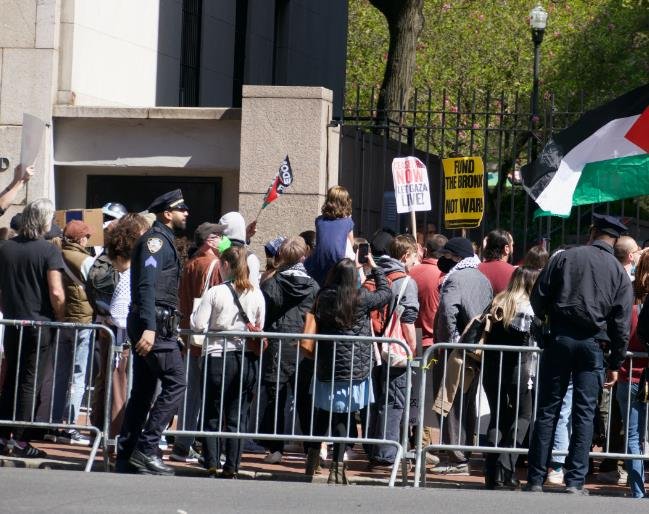Prosecutors are moving to dismiss hate crimes charges against Maxwell Friedman, a woman accused of attacking an Israeli student on Columbia University’s campus. The incident occurred in the aftermath of Hamas’ Oct. 7 invasion of Israel. Friedman, who also goes by Malaika, was charged with multiple counts of assault and other offenses for allegedly striking the Israeli student with a stick during a dispute over Israeli hostage posters. The Manhattan district attorney’s office announced that Friedman accepted an offer to dismiss the case, contingent on her completion of social services and a public apology.
The altercation took place outside Columbia’s Butler Library, where the Israeli student and others were posting fliers about the casualties in Israel. Friedman, 19 at the time, was seen tearing down the fliers, which led to a confrontation. During the dispute, Friedman allegedly struck the student with a stick, causing injuries to his hand. Initially, the charges included assault in the second and third degrees as a hate crime, harassment, and weapons possession. The district attorney’s office later determined that Friedman did not intentionally hit the student, as video evidence showed her waving the stick when the student was struck.
Friedman’s age and lack of criminal history played a significant role in the decision to offer an adjournment in contemplation of dismissal. This legal agreement allows the case to be dismissed if Friedman avoids further legal trouble for six months. The agreement also includes an order of protection for the victim, ensuring his safety during this period.

Legal Proceedings and Public Reaction
The legal proceedings have garnered significant public attention, with opinions divided on the appropriateness of dismissing the hate crimes charges. Some argue that the decision undermines the severity of hate crimes, while others believe it offers a chance for rehabilitation. Friedman’s completion of three sessions with Manhattan Justice Opportunities, a social services group, was a key factor in the dismissal offer. This program provides counseling and other services as an alternative to incarceration for certain crimes.
During a court appearance, Friedman made a public apology, expressing remorse for her actions. The district attorney’s office emphasized that the decision to dismiss the charges was influenced by Friedman’s willingness to learn and her participation in the social services program. The case highlights the complexities of addressing hate crimes and the balance between punishment and rehabilitation.
Impact on the Community
The incident and subsequent legal proceedings have had a profound impact on the Columbia University community. The altercation and the charges brought against Friedman sparked debates about hate crimes, free speech, and the appropriate response to such incidents. Students and faculty have expressed a range of emotions, from anger and frustration to empathy and a desire for restorative justice.
The case has also prompted discussions about the role of social services in the criminal justice system. Advocates for restorative justice argue that programs like Manhattan Justice Opportunities can provide meaningful rehabilitation and reduce recidivism. Critics, however, contend that dismissing hate crimes charges may send the wrong message and fail to hold offenders accountable.
